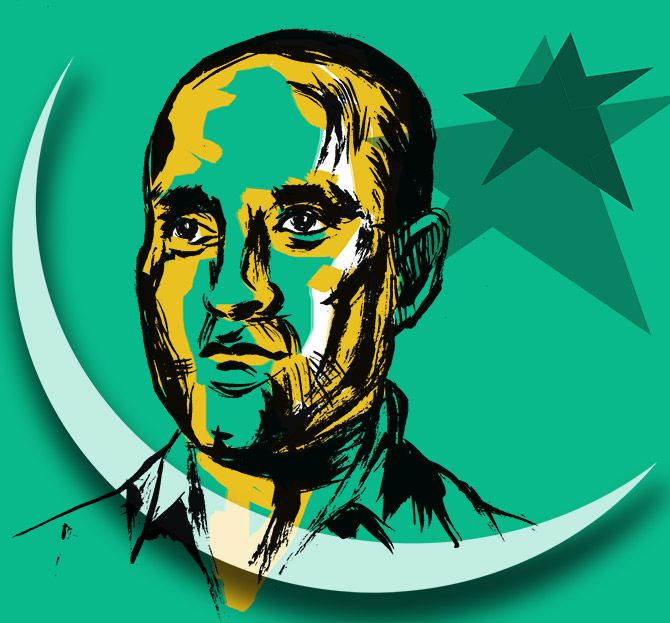'India can replicate what Pakistan did to Kulbhushan Jadhav should the need arise.'
'Hopefully, Pakistan will see reason before that transpires,' says Ambassador G Parthasarathy, former high commissioner to Pakistan.
Illustration: Dominic Xavier/Rediff.com

On the same day that former Indian naval officer Kulbhushan Jadhav was handed a death sentence for alleged espionage by a Pakistan army field general court martial, the Pakistan senate denounced past military interventions, regretting that army rulers who abrogated the country's constitution had never been punished.
This was rather ironic as it was this same senate that had abdicated authority and handed over absolute powers twice over the past three years to military courts and the army chief to prosecute civilians on charges of terrorism.
Over the past two years, these military courts have convicted 274 people, with 161, largely Pashtuns, receiving death sentences.
There are murmurs even within Pakistan that these convictions were arbitrary and the cases would have been thrown out in any democratic country.
I recall being told in 1983 by Justice Fakhruddin Ebrahim, one of Pakistan's most respected jurists that then prime minister Zulfiqar Ali Bhutto's death sentence pronounced during the days of General Zia-ul Haq's martial law regime was nothing but a total travesty of justice.
Civilian rulers have since then been wary of being on the wrong side of any army chief.
Pakistan, even today, remains a 'Garrison State.' Moreover, Prime Minister Nawaz Sharif is facing charges of corruption in Panamagate and is under siege from the judiciary, the Opposition and the army.
Amidst this turmoil, army chief General Qamar Javed Bajwa has chosen to cozy up with Opposition leader Imran Khan, who himself is known to be a protégé of former ISI chief, the infamous late Lieutenant General Hamid Gul.
Kulbhushan Jadhav's so-called trial, described by India as 'farcical' was conducted in what can only be described as a kangaroo court. He is said to have been arrested on March 3, 2016 in Baluchistan's Mashkel area.
He has been charged for 'espionage and sabotage' in a mission to disrupt the China Pakistan Economic Corridor and Gwadar port, which is under de facto Chinese control.
He is also said to have been involved with Baluchistan 'freedom fighters and R&AW handlers' to undertake 'various activities which are criminal and anti-national.'
The chargesheet appears to give Jadhav supernatural powers to single-handedly destabilise not some small town or village in Pakistan, but the entire $51 billion China-Pakistan Economic Corridor and Gwadar port, which is guarded by the armies and navies of both Pakistan and China!!
The case against Jadhav was so weak that Prime Minister Nawaz Sharif's cabinet level foreign affairs adviser Sartaj Aziz acknowledged in December 2016 that all that the military court had was 'mere statements,' but no serious evidence.
Jadhav was working for a private company in the Iranian port of Chahbahar -- a port which India has pledged to construct, as the focal point for transit for trade with Afghanistan and Central Asia.
Gunter Mulack, a former German ambassador in Pakistan, has gone further than what India has said of Jadhav being abducted from Chahbahar, by stating that he had actually been caught by the Taliban in Iran and sold to the ISI.
If Jadhav was indeed a spy as Pakistan claims, he would hardly have ben carrying a valid Indian passport with him.
There have been many cases of Indians charged in Pakistan for illegally entering the country for espionage. None of them was ever arrested with a valid Indian passport!!
The entire process of obtaining repatriation of persons accused and convicted of espionage has been spread out over years in the past.
Discussions I have had with well-informed Pakistani lawyers suggest that following confirmation of the death sentence by the army chief there could be one more round of consideration by an appellate authority, which would be unlikely to over-rule the army chief.
The final authority in the appellate process is the president of Pakistan.
One can never be sure about what precisely has transpired in the court martial proceedings, as Pakistan denied India consular access to Jadhav on 13 occasions and also prevented India from assisting in the appointment of a legal representative.
The appellate process will end with the confirmation by army chief General Bajwa if there have been any other charges under the more recent powers acquired by the army. We would need an official confirmation on this from the Pakistan government.
India has never sent a Pakistani spy to the gallows.
Under the Vienna Convention both countries have expelled personnel of diplomatic missions when they have been caught involved in 'actions incompatible with their diplomatic status,' a euphemism for spying.
But Pakistan is now under virtual siege, with charges of fostering terrorism in India and Afghanistan and its nationals, or former nationals, involved in terrorism across the world ranging from Chechnya to Europe, the US and Canada.
The Kulbhushan Jadhav drama is being staged by the Pakistan army primarily to divert attention from its image worldwide as a State sponsor of terrorism.
At the same time, it is facing lowback, with terrorist strikes across the Durand Line, mounted by terrorists from groups it nurtured earlier like the Tehreeq-e-Taliban-e-Pakistan.
Pakistan should be left in no doubt that retribution will be devastating if it proceeds to execute the military court's verdict.
Issues involving espionage and other covert actions are always murky. It is best to keep a lot of what is transpiring out of the public domain as this process plays out.
Pakistan's citizens, including its military and intelligence officials, are involved in activities ranging from smuggling of counterfeit Indian currency to promoting terrorist and sectarian violence across India, from the soil of third countries, particularly in our immediate neighbourhood.
India can replicate what Pakistan did to Kulbhushan Jadhav should the need arise.
Hopefully, Pakistan will see reason before that transpires.
MORE features on the KULBHUSHAN JADHAV case in the RELATED LINKS below...









